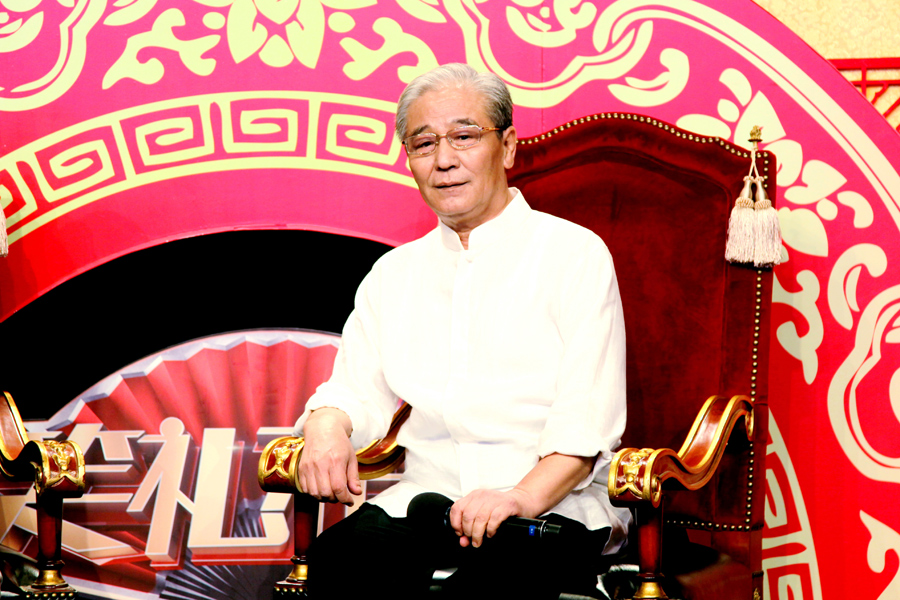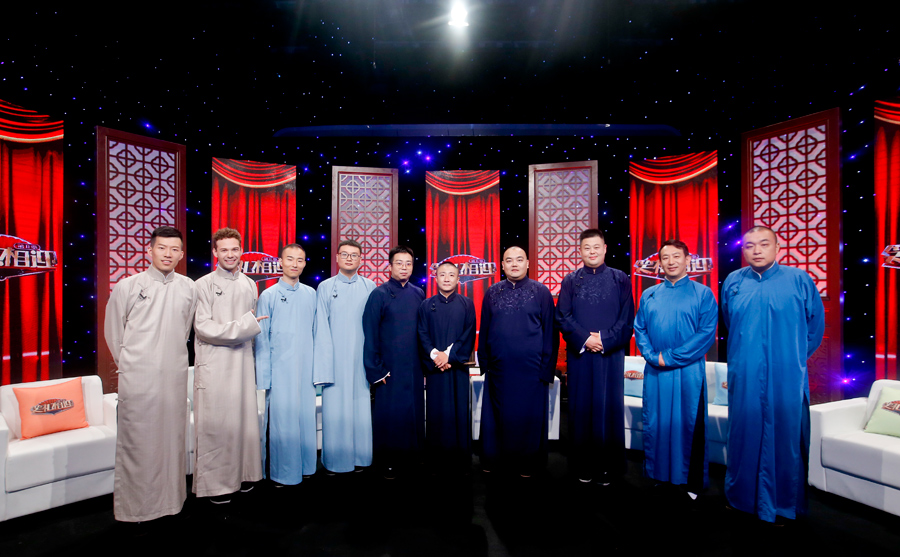
From the People's Daily App.
This is Story in the Story.
Xiangsheng was first staged in Beijing in 1862, when the performers began to appear and attract audiences at the Tianqiao area of the capital.
Tianqiao was a place where street artists gathered and performed a variety of shows, such as acrobatics, Peking Opera and pingshu, a traditional Chinese art form of storytelling.
Xiangsheng performances usually involve two performers clad in traditional long robes, standing behind a wooden table and engaging in witty banter. The four basic skills include talking, imitating, teasing, and singing.
The chief topics of their humorous conversations include troubled family relationships, while the aim is not only to entertain but also to educate.
As with Peking Opera, the crosstalk training is harsh and requires great discipline.
Young comedians studied under a master for at least three years and performed with the teacher to gain experience of mastering the techniques onstage and of communicating with the audiences before striking out on their own.
Today’s Story in the Story looks at Crosstalk, a centuries old Chinese performance-based art that still remains in strong demand among all generations.

Ma Zhiming. (Photo: China Daily)
When a budding Peking Opera actor was told he lacked the voice to have any future in the art, he looked back on his childhood years as he sought to use his voice in a different way.
It seems that Ma Zhiming was born with xiangsheng surging through his veins.
"It was so natural to me that it was just like breathing," said Ma, 74, whose father was Ma Sanli, one of the most famous performers of the art, a traditional form of comedy performance. Xiangsheng, which literally means face and talk, and commonly known as “crosstalk.”
"At home I watched family members writing scripts, practicing and rehearsing for the performances. At the theater, I followed from the backstage to the stage," said Ma Zhiming.
Ma Sanli retired when he was 87 and two years later died of cancer. Ma Zhiming's grandfather, Ma Delu, was dubbed one of the eight distinguished xiangsheng masters of his generation. The Ma family's ties with crosstalk date back to the Qing Dynasty (1644-1911).
As for Ma Zhiming, despite his love for crosstalk, his dreams turned to another performing art, Peking Opera, and he enrolled to study it in Tianjin when he was 12 years old, in 1957.
That decision to turn away from crosstalk was made all the easier in that his father, who had seven other children, did not want to train any of his children to become a performer, because its performers were almost always from poor backgrounds, and he wanted something better for his progeny.
Five years after Ma Zhiming took up Peking Opera, one of his teachers broke the news to him that there was no way that he would ever become a leading player because his voice simply was not good enough.
"Why not learn crosstalk from your father?" the teacher asked. "With Ma Sanli's background surely you'd have a smooth path?"
Ma Zhiming replied: "I do love it, but my father taught me nothing about it. He wanted his children to be independent and make a living on their own. I picked up what I knew about it just by observing and imitating those doing it."

Crosstalk performers from the third season of Tianjin Satellite TV reality show Laugh Out Loud. (Photo: China Daily)
Recognizing his son's obvious passion for crosstalk and his ability to retain and recite complicated lines, Ma Sanli agreed and let him work at Tianjin Traditional Folk Arts Troupe, home to many great performers, and Ma would become an apprentice to Zhu Kuoquan, who had taught Hou Baolin.
At the age of 17, Ma would make his stage debut as a crosstalk performer.
"Comedy is extremely hard," Ma said. "With crosstalk you've got only two performers on stage trying with their dialogue to get everybody to laugh. I've seen many different kinds of laugher in audiences, such as belly laughs, chuckles and an occasional guffaw, each of which performers interpret in a distinctly different way."
In 2017 Ma Zhiming celebrated his 60th anniversary as a crosstalk performer and then withdrew from the limelight.
The worst experience for a performer, Sheng said, is when the punch line is delivered "and absolutely no one laughs.”
There have been times, such as in the early 1990s, when like many other traditional Chinese art forms, it seemed to be on the brink of extinction, threatened by other contemporary entertainment, but thankfully it has lived on to see better days.
"Modern people are often under much pressure and need to relax. Of all the ways of entertainment, xiangsheng is old yet evolving. Anything you see could be your inspiration,” said Ma.
(Produced by Nancy Yan Xu, Lance Crayon, Brian Lowe and Paris Yelu Xu. Music by: bensound.com. Text from China Daily and Global Times.)


